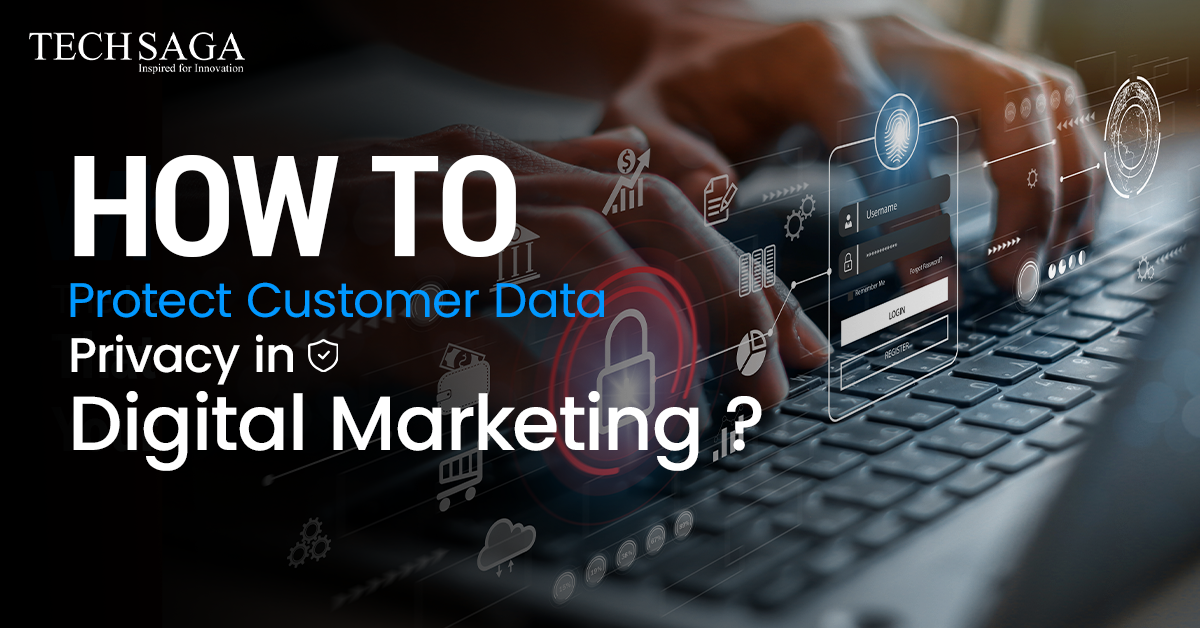Team Techsaga
Gain valuable insights and stay updated with the latest innovations through our engaging blog. Explore trends, technology advancements, and expert opinions to navigate the ever-evolving world of IT.
How to Protect Customer Data Privacy in Digital Marketing?
In the digital age, where vast amounts of data are constantly being exchanged, processed, and analyzed, safeguarding customer privacy has become paramount. Digital marketing, a field intrinsically tied to data, plays a pivotal role in ensuring that personal information remains protected. You might not be aware of some of the dominant facets that play a crucial role in developing Digital Marketing Agency in Noida. From the everyday consumer to the global enterprise, there is an ever-growing concern about how data is used, stored, and shared.
This not only impacts the trust a consumer places in a brand but also holds legal and ethical implications for businesses. As such, the responsibility of protecting customer data is not just a moral duty but also a business imperative. This guide will delve into the intricacies of ensuring customer data privacy in the realm of digital marketing and digital marketing solution.
Within the framework of this article, we will highlight best practices, tools, and strategies that every marketer should be well-acquainted with in this dynamic landscape. Whether you’re a seasoned marketer or just beginning to navigate digital waters, this guide will provide invaluable insights to fortify your defenses in the battle to protect customer data.
Measures To Insure the Protection Of Customer Data Privacy:
You must put in place a thorough set of safeguards that address numerous facets of data collecting, storage, processing, and sharing in order to guarantee the privacy of client data. Such measures do play a prudent role in the applications of google my business. All of these measures are taken into account by TechSaga, one of the best Digital Marketing Company in Noida. The following are some particular actions you can take:
Encryption of data
Use encryption technologies to protect data transfer between users’ devices and your servers, such as SSL/TLS. Strong encryption techniques should be used to encrypt sensitive data that is kept in databases or on servers.
Secure Access Control and Authentication
To prevent unwanted access to client accounts, use strong authentication techniques like two-factor authentication (2FA). Apply role-based access controls to limit access to data to just those employees who are permitted.
Security audits and penetration tests on a regular basis
To find weaknesses in your systems, do routine security audits and assessments. To simulate potential attacks and resolve any holes, do penetration testing.
Data reduction and purpose restriction
Only gather the bare minimum of information required for your company’s activities. Customers’ data should only be used for the purposes that have been expressly stated and should not be used for any other purposes.
User Agreements and Privacy Statements
Create short privacy rules that outline the procedures for gathering, using, and safeguarding consumer data. By requesting their agreement to your terms of service and privacy policies, you can make sure that users give informed permission.
Data Retention Policies
Establish clear guidelines for how long customer data will be retained and when it will be deleted. Automatically delete data that is no longer needed for the specified purposes.
Vendor and Third-Party Management
Vet third-party vendors for their data protection practices before sharing customer data with them. Include data protection clauses in contracts with vendors to ensure they meet the required standards.
Employee Training and Awareness
Train your employees on data privacy best practices, security protocols, and the importance of protecting customer data. Subsequently, you should mplement strict protocols for handling customer data within your organization.
Incident Response Plan
Develop a comprehensive incident response plan to address data breaches or privacy incidents promptly. Therefore, you might clearly outline the steps to take in the event of a breach, including notifying affected parties and authorities.
User Rights and Consent Management
Provide customers with mechanisms to access, modify, and delete their data.
Allow users to manage their consent preferences. However, you can ensure they might easily revoke consent if desired.
What Are The Harmful Elements That Might Hamper Your Data Privacy?

Within this section, we will try to provide you with a thorough analysis of the elements that might hamper overall data privacy. Digital Marketing is highly affected by such ailments. Therefore, they must be thoroughly studied and understood so that necessary actions can be taken against them:
Attacks online and hacking
To acquire unauthorized access to client data, malicious actors may try to enter your systems. Subsequently, this might happen through hacking, phishing, or other cyberattack techniques.
Ransomware and malware
Your computers may become infected with malware (malicious software) or ransomware. Furthermore, this enables attackers to steal data or demand payment in return for regaining access.
Internal Threats
Sensitive data may be accessed or leaked by employees, contractors, or other members of your firm. Moreover, this might happen either knowingly or unknowingly compromising data privacy.
Insufficient Security Measures
Inadequate security measures, such access limits, encryption, and security patches, might leave your system vulnerable.
Weak Password and Authentication Policies-
Therefore, unauthorized access to client accounts and data may result from weak passwords or insufficient authentication procedures.
Employee Undertraining
However, employees who are not knowledgeable of best practices for data protection may unintentionally take activities that endanger data privacy, such as falling for phishing schemes.
Deficiencies in Third Parties
However, if third-party suppliers or partners don’t have reliable data protection mechanisms in place, sharing client data with them might be risky.
Unsecure Data Transmission and Storage
Subsequnetly, customer data can be intercepted and stolen if it is stored on unprotected devices or sent via unencrypted networks.
Regulations not followed
Furthermore, it may be legal and financial repercussions if data protection laws like GDPR, CCPA, or HIPAA are not followed.
Concluding Remarks:
In the rapidly evolving landscape of digital marketing, safeguarding customer data privacy has emerged as a paramount concern. As technology continues to reshape how businesses interact with their audience, it is imperative that organizations take proactive steps to ensure the security and confidentiality of customer information.
TechSaga is one of the best Application Maintenance Services that is a highly reliable and effective firm. Through their assistance, you would not have to face any issues in regard to any data privacy measures. You will find the best experts that will work for you relentlessly.
Read Also:- Tips For Successfully Transitioning To a Fully Remote Work Team
TAG: Digital Marketing




